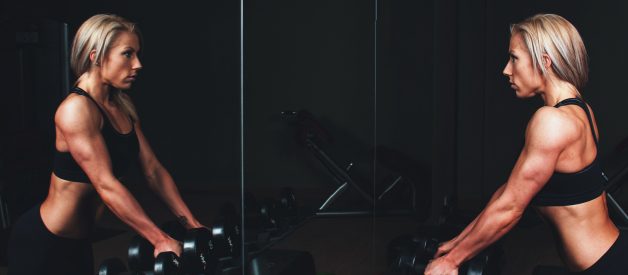Physique athletes use carb cycling to lose fat while preserving muscle mass
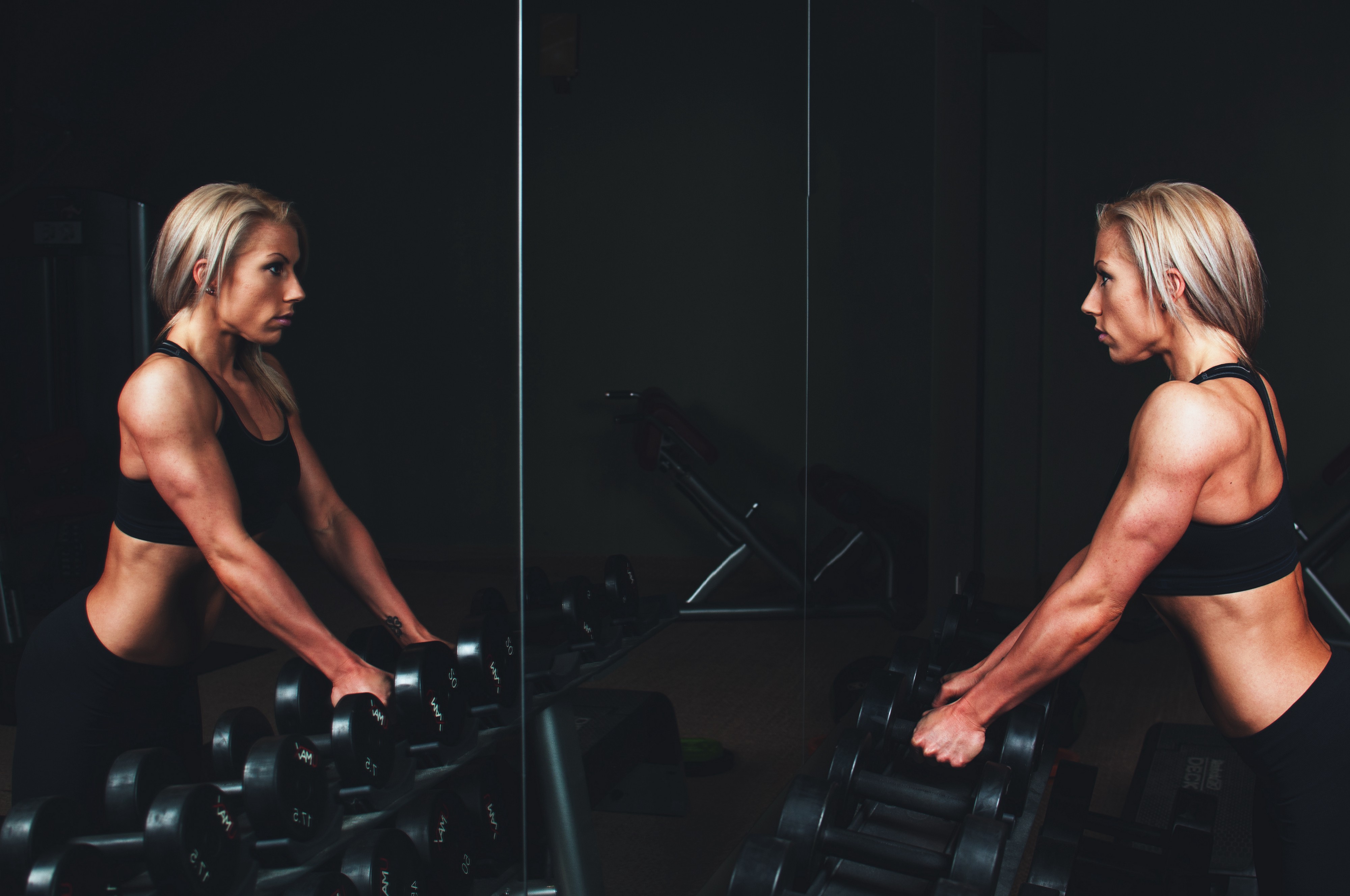 It?s just like looking in a mirror. (Photo by Scott Webb on Unsplash)
It?s just like looking in a mirror. (Photo by Scott Webb on Unsplash)
Disclaimer: I am not a doctor. This is not intended as advice, but as a retelling of my own experience. Get thee to a medical professional for approval, a registered dietitian for guidance and an educated, certified personal trainer for a balanced programme and safe lifting techniques.
A fitness competition is not a health competition.
I cannot stress the above enough. Neither is bodybuilding, for that matter. Physique athletes put in months or years of weight training to create good shape and symmetry. Like bodybuilders, fitness competitors eat healthfully, with lots of fresh food, lean protein sources and healthy fats; they avoid sugars, ?white foods? and alcohol. They drink litres of water daily. On top of this, fitness competitors train specific strength, flexibility, gymnastics and dance for a 2-minute, high-energy routine. It?s a lot of work just to look good naked but overall, it?s not a bad life, if you have the time and inclination.
But the eight to twelve weeks before a show is where everything gets tragic.
The shredding or cutting phase is a necessary evil. To look amazing on stage for just one day, competitors spend three months or more shredding as much fat as possible while trying desperately to hold on to the beautiful, hard-earned muscles they have built. Evolution has made this as challenging as possible; human bodies really aren?t made for this. However, by obsessively controlling the types, amounts and timings of food eaten, it?s possible. Most competitors also add in long, boring, early-morning-on-an-empty-stomach cardio sessions. Some even harness the metabolism-boosting power of smoking to lose the weight. They drink more and more water.
They feel tired, lethargic and pressured (when they?re not amped up on life-giving caffeine). Their friends and family think they?re idiots and that ?one little piece? of cake or pizza won?t hurt. They have a hard time with basic math. They are grumpy and no fun to be around. And don?t get me started on the tanning bed time they need to put in.
See? Not a health competition.
Human bodies really aren?t made for this.
I have been that grumpy idiot seven times. During a cutting phase, most of my brainpower goes into eating the right amounts and combinations of food at the right times and trying really, really hard to not think about any other kind of food, all of which is tastier than what I get to eat. The rest of it goes towards trying not to cry or stab anyone.
(From my experience, the worst part is that one little bowl of ice cream could make everything all better, but I can?t have it, because I have to be on stage in a bikini in? oh dear, is it only five weeks now?)
Small Changes, Big Results
Change Your Lifestyle Without Trying (Too Hard)
fityourself.club
Choosing a strategy
For my first competition, I hired a trainer who specialized in bodybuilding. He was brilliant, competed himself and had trained several other men and women to victory. He took a look at my protein shake- and bar-heavy nutrition log, and said, ?Do you eat any real food?? He also mocked my workout regime, which he called, ?literally, the least you could do and still call it working out?, but this isn?t about that.
He let me keep one shake and half of a bar per day, then wrote down the rest of my diet. It was full of excellent, healthy whole foods, carefully considered by their glycemic index and optimized for a fitness athlete?s needs. It was the kind of food that he and his successful clients ate. But I didn?t like tuna and rice cakes, so I struggled to follow it.
When he moved away halfway through my prep, I panicked briefly, then used it as an opportunity: I harnessed my nutrition background to do my own thing, adding in fruit, raisin bran cereal and milk for breakfast and higher-carbohydrate soy protein. I decided that, rather than do extra cardio (or really, cardio at all), I would just eat no other carbs.
A week before my first show, a supplement store salesperson yelled at me for all of that and scared me into doing cardio and eating only oatmeal and egg whites for the next seven days.
Creating my plan, my way
I somehow won my first show, and decided to keep that ?diet? going for the next six weeks to compete in Provincials. When I stepped onto the stage at a skeletal 95 lbs, I realized how much muscle I had lost by ?doing my own thing? and not having an actual plan. If I was going to stand a chance at the next year?s Provincials, and qualify for Nationals, I would need to build my muscles back up over the winter, then take the time to diet down the right way.
Repeat after me: food is fuel.
When I was competing, it was way back in the Time Before Apps. The Nutrient Value of Some Common Foods was my go-to guide for checking my food values. I am (still) a spreadsheet and notebook person/nerd, so I found that it was an enjoyable project. Nowadays, there are newfangled tracking apps like Nutrition Facts that you can use to create an eating plan and schedule while you?re still thinking straight, and put it into an easy-to-follow document that you can reference as needed. When you?re dieting down, you can?t trust your judgement. Trust your plan.
Also, buy a food scale. Your hungry, hungry brain will try to trick you into eating less chicken and more potatoes. Be one step ahead.
The basics
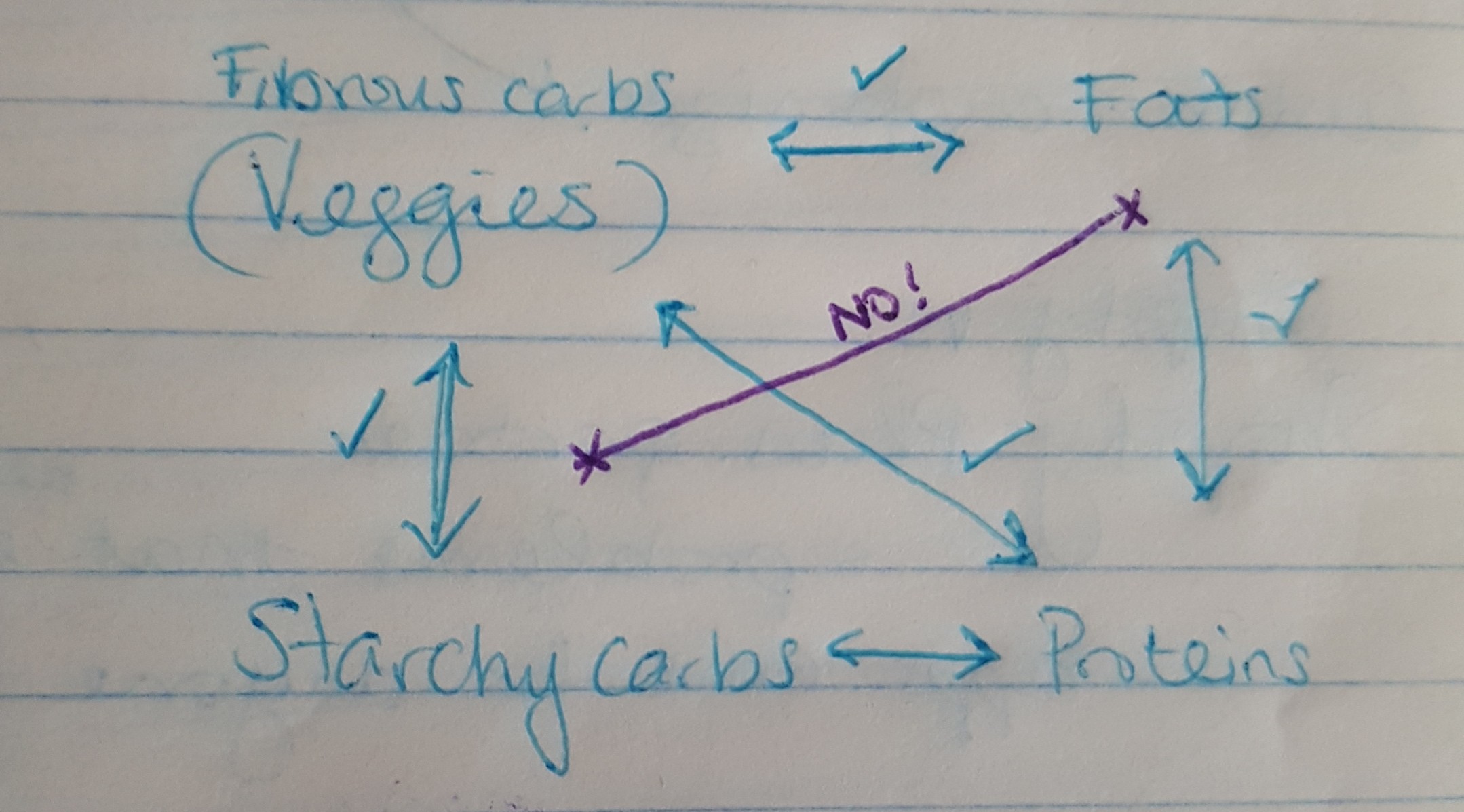 My interpretation of a simple (yet effective) system
My interpretation of a simple (yet effective) system
With all the early-2000s options of South Beach, Atkins, Eat Right for your Blood Type, etc. out there, I had started with ?just eating clean? (which is now its own movement, bless). As soon as I cut out eating anything that wasn?t specifically healthy ? actually, as soon as I cut out chocolate ? I started to drop fat, but, as I don?t naturally gravitate towards enough protein to maintain muscle mass while I?m trying to starve the fat off the top, I was losing my shoulders as fast as my cheeks. I needed to find a way to fuel my workouts while still losing fat, and decided to give carb cycling a try.
Simply put, in a competition diet, food (food is fuel, not fun) can be broken down into four groups:
Fibrous carbs are the good guys. You can eat as much of these as you want, at any time, in combination with anything. Leafy greens, all (non-potato) vegetables, legumes, and some fruits with peels, like apples. They give you vitamins, fibre and make you (sort of) feel like you?re full when really you?ve only eaten a salad: maybe a giant salad the size of your head, but still, just a salad. Stop thinking about it.
Proteins are the building blocks of muscles. Animal proteins are still the purest, most superior choice (that is, they don?t come with extra carbs attached)(sorry, vegans), but any little bit counts. Meat, poultry, eggs, fish, and yogurt, nuts, beans, tofu, whey or soy protein? you need protein to build muscle and to hang on to muscle. It also helps you feel full and burns more calories while you eat it.
Starchy carbs are great fuel for intense workouts and recovery, though their sugar content can spike insulin levels and create reactions which store fat. They are potatoes, rice, pasta and bread. For our (simplified) purposes, they can also include most fruits and sugars. In short, they are delicious and make you happy. They?re the body?s favourite fuel. Also, the brain runs on sugar. No sugar = no smart.
Fats are essential for health. They contain vitamins for your eyes, hair, skin and digestion. They are good for making you feel full and have a pleasant ?mouth feel?. They?re oils, nuts, seeds, avocado and butter. They can be used to fuel your brain or your muscles if they really need to. But, they should be ingested AWAY from starchy carbs. So put that fettuccine alfredo down.
You?ve gotta keep ?em separated
The last two (starchy carbs and fats) are problematic when eaten together.
Carbohydrates (which break down to glucose) are the body?s preferred fuel. If there is any glucose floating around in your bloodstream, your body will burn that first. Actually, it will burn alcohol first, but since we?re talking about competition diets, let?s pretend that there is no alcohol in your bloodstream for 6?12 weeks (another reason why you are cranky). When you eat sugars or starchy foods, your body sends out insulin, stimulating a mechanism by which carbs are burned or stored in the muscles as glycogen. Any free fatty acids in your blood, if they?re not burned, are stored as fat. (Back to alcohol: this is why eating french fries with gravy after drinking is bad for your waistline ? all that potato and grease won?t be used as fuel till the alcohol is all used up, so you?re probably going to end up storing a lot of it as fat.)
When your body has no more carbs to burn (on a low-carb diet, or first thing in the morning, or after a longer, low-intensity cardio session), it harnesses the energy stored as fat. It?s not a great fuel for higher-intensity exercise, and unfortunately, the breakdown of fat (ketosis) for brain function is a very second best option, like putting vegetable oil into your diesel car. Will the car still run? Yes, but it will be sluggish and inefficient, and you probably don?t want it calculating a tip. Or coordinating air traffic.
When you?re dieting down, you can?t trust your judgement. Trust your plan.
The answer is not to simply stop eating either carbs or fat (see also, every diet from the 90s and early 00s). Each group is important for health and performance, and nothing should be completely avoided. You just need to adjust the times that you eat these foods.
In the simplest terms, in the most convenient definitions it looks a little something like this
Eat your starchy carbs (and protein) earlier in the day, when you have hours of opportunity to burn it off. Eat veggies and protein all day long, and save your fat (and protein) for evenings and before bedtime. The earlier you stop eating carbs (and/or the less carbs you eat), the sooner (after a 3-hour window or so) you can add in delicious fat (and/or more of it).
Eat smartly and often ? metabolism-boosting benefits of eating small meals more frequently haven?t been proven, but there are lots of other benefits of eating often; for one, you don?t get as hungry between meals, so you?re less likely to binge out on bad choices out of the cloudy judgement of starvation.
For early-morning cardio, a necessarily evil, I would drag my sorry self out of bed before 6am and into workout gear, then onto a stationary bicycle or treadmill for a slow spin or trudge for 30?45 minutes. Afterwards, I?d drink water and a protein shake, to keep the fat-burning ?uh?burning for as long as possible.
You need to consult professionals, and you need to be willing to experiment to find out what works best for you.
My process
I started by listing all the (whole, healthy) foods that I liked to eat: meat, poultry, fruits, vegetables, starches, and other protein sources that I could stomach (eggs, protein powder, cheese and peanut butter in moderation).
Armed with my two sports nutrition courses and my nutrient values document, I created a framework for eating every two-and-a-half to three hours, and started inputting the food choices, putting my fruits and starchy carbohydrates earlier in the day and my higher-fat options later in the day. I tried to add several options for vegetables, with a large focus on leafy greens, colourful choices and those frozen for convenience, then started crunching the numbers.
I prepared three basic days: one-, two- and three-carb (or low-, medium- and ?high?-carb), which were rotated for different intensities of workouts and switched around as needed as the competition got closer. For example, on days that I trained large muscle groups like legs or back, or had gymnastics sessions, I could eat oatmeal for breakfast, then a potato, then rice to better fuel my workouts and allow for good glycogen replenishment afterwards. On lighter days (arms, shoulders and cardio) or rest days, I ate mostly protein and fats (after my carefully-measured daily breakfast of oats and protein powder, which I referred to as ?the high point of my day?), ending with a bit of extra fat before bedtime. By the last three weeks of contest prep, I was down to one, three-carb day per week, and savoured my morning oatmeal for as long as I could.
Try not to cry or stab anyone.
My food choices
Lower your expectations. Food is fuel. Don?t expect gastronomic delights, but also don?t force yourself to eat foods you don?t like. Aim for foods that you?re willing to tolerate, and eat a variety of them.
For me, No Fish was non-negotiable. It?s good for me, sure, but it tastes bad. Without delicious sauces, there was no way ? it would have broken me. So, I didn?t eat it.
I ate beef (usually ground, but steaks here and there on the happiest of days). I would cut it up into chunks (steakbits) so I could eat it easily. Some people thought I was snacking on brownies. ?No,? I said. ?It?s steak-in-a-baggie.? Bedtime snack was sometimes 3 oz of ground beef, sauteed and drained, topped with salsa. So good.
Chicken. So. Much. Chicken. Ground, breasts, and canned (which I like to call appetite suppressant). I invented Atomic Chicken ? divide up your chicken breasts to freeze individually and add a splash of fat-free italian dressing. It marinates as it thaws. Pop it into a microwave-safe dish, nuke it for 4 minutes, and ta-dah! Still not as bad as fish. I did lots of Foreman grilling, sometimes with Mrs. Dash salt-free lemon-pepper seasoning to make it?slightly better. Repeat after me: food is fuel.
Egg whites by the (1L) carton. Ketchup has ?too much sugar?, but honestly, I ate them with ketchup. During stricter phases, I?d switch out the ketchup for salsa (read the ingredients) or melt a piece of processed cheese on top as I, yes, nuked it in the office microwave.
Vegetables, fresh and frozen. All the time. Lots of salads and raw veggies. Sometimes with (measured amounts of) hummus, sometimes with the world?s most delicious spice, sometimes with another slice of processed cheese melted on top.
Potatoes, the food of the gods. Why is a 4-oz piece of chicken so huge, but a 3-oz potato (baked, plain) so small? Because potatoes are the best thing on the entire planet and you can never eat enough of them. Once, I was baking up potatoes for a few days, and I ended up cutting a slice off of one?then another?then?I ate two, 8-oz potatoes in one sitting, and had to do an extra 60 min on the treadmill for the next three days. And I missed my cheat day because I wasted my extra-fun-carby-time on potatoes. This happened more than once.
Peanut butter: natural, not the delicious stuff with the extra corn syrup and salt added. A paltry,(measured-ish) heaping tablespoon before bed. The days I didn?t measure it, I assume that I ?may? have had 3 tablespoons. Heaping means whatever the spoon can hold, right?
Fruit? Rarely. An apple or some strawberries, and only before noon. But, if I was going to meet a sugar craving head-on, I?d much rather that it be managed with a piece of (forbidden) fruit than go out of control on my weight in chocolate.
Never let an unsupervised marathoner make you a protein shake.
The supplements
Protein powder: I didn?t care too much about the purity/quality, as long as it tasted ?good? (manage your expectations) mixed with just water. Once, my then-boyfriend offered to make me a protein shake (he was preparing for a marathon ? his whole life was pasta ? while I was preparing for a show). He brought the blender jug to where I sat on the couch and I took a sip. I almost spat it back in because it was so creamy and delicious. ?What?s in it?? I sputtered. ?Protein powder! And blueberries, orange juice, yogurt and some ice cream.? Lesson learned: Never let an unsupervised marathoner make you a protein shake. I?d drink a shake after morning cardio or mix the powder with my plain oats (and a few sliced strawberries ? sliced tiny so that it would feel like more), and have another one after training.
Vitamins: multivitamin, calcium, Vitamin D. (Still not a doctor.)
Glucosamine to help the pain in my poor, abused wrists and ankles from gymnastic training.
Glutamine (after workouts or before bed on non-weight days), to help recovery and immune function. (I wonder if that?s still a thing?) (Answer: sort of, but not really.)
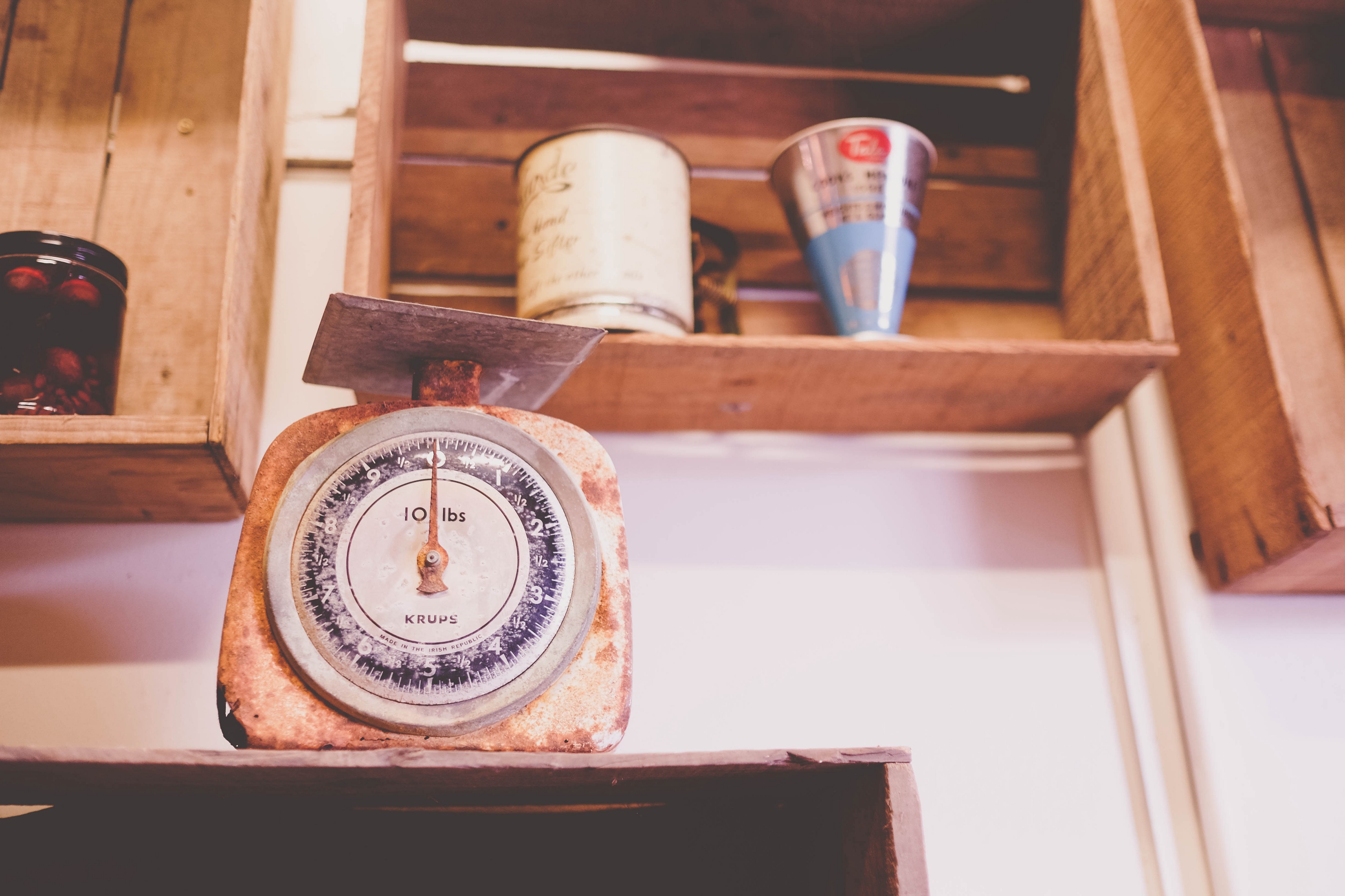 Food scale: both important and demoralizing. Photo by Calum MacAulay on Unsplash
Food scale: both important and demoralizing. Photo by Calum MacAulay on Unsplash
Sample day:
6 am: 30?45 minutes easy cardio on an empty stomach (booo)
7 am: c. oats, c. allbran, 1 scoops whey, 2 strawberries, multivitamin, calcium supplement, glucosamine tablet (?High point of my day?)
10 am: 4 oz. chicken breast, 3 oz. potato, 1 c. veggies
1 pm: 8 egg whites, 1 slice low-fat cheese (?Low point of my day?)
3:30 pm: 1 scoops whey (mixed with water and 5g L-glutamine)
6 pm: 4 oz. chicken breast, 1 c. veggies, 1 Tbs. full-fat dressing
9 pm: 3 oz. ground beef, 2 Tbs. salsa, 5g L-glutamine
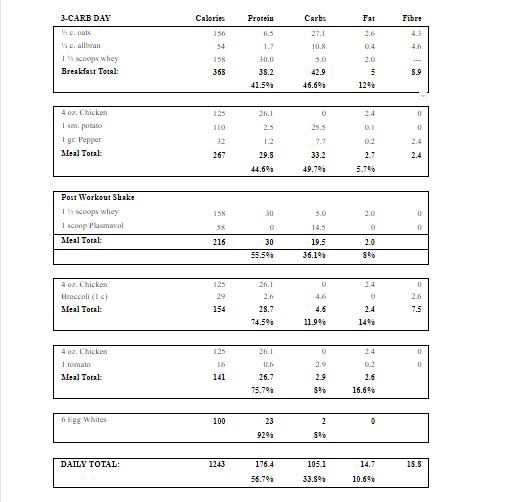 This is exactly what I ate. I don?t need your pity!
This is exactly what I ate. I don?t need your pity!
My breakdown
My truths at the time were based on the wisdom of 2000?2005, and were as follows:
Competition Weight: about 100 lbsCalories per day: 1200?1700 Protein intake: 1.5?1.8 g per pound of body weight (150?180g, depending on training day)Meal timing: Every 2.5?3 hours, starchy carbs only allowed until 2 pm (or earlier, depending on training day), protein and fat before bed
Everything works, but nothing works forever
This combination of cycling carbs and fats with higher levels of protein worked for me. After the first season, I improved my showing and my look, able to keep more muscle and be on stage leaner each time. I know competitors who ate brown rice with dinner every night (I could dream!) and others still that ate citrus fruit before bed but couldn?t tell me why. (Another truth is that everything works, but nothing works for everyone.) As I mentioned first, you need to consult professionals, and you need to be willing to experiment to find out what works best for you.
After the first year and a half of trial and error with my body ? especially in the last week pre-competition, when water retention really mattered ? I made significant changes in my physique, and steadily improved how I looked onstage by maintaining more muscle as I stripped off the fat.
It was quite the ride; I got to apply what I learned at school and be my own guinea pig, all the while discovering what I could do within the genetic limitations of my human body (I found a kick-ass vein on my uneven-yet-defined abs!) with just a notebook, a food scale and a few good cries.
Karen (Power) Hough is a writer, editor and blogger with an Honours BSc. in Human Kinetics. She currently lives in London with her husband, three energetic kids and a codependent dog. She has won Miss Fitness Ottawa, Miss Fitness Ontario, and finished top three at the CBBF Fitness Nationals (3rd place) and the CBBF Natural Fitness Nationals (2nd place). She was eating cookies as she wrote this.
